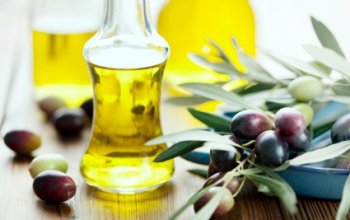There is plenty of evidence that suggests that olive oil is beneficial to health – should you be adding this distinctive oil to your diet? Should you replace more affordable oils such as sunflower or canola oil with this costly oil? There are many varieties of olive oil – which do you use? Does "light" olive oil provide fewer kilojoules?
What are the health benefits?
Olive oil is an excellent source of monounsaturated fats (around 75% of its fat) and low in saturated fats (about 13%). It is well accepted that replacing saturated with unsaturated fats in the diet will help reduce the risk of coronary heart disease.
Some of the beneficial effects of monounsaturated fats on cholesterol levels are that they can lower LDL (bad cholesterol) levels without lowering HDL (good cholesterol) levels. Other favourable properties of olive oil are that they contain powerful antioxidant compounds called polyphenols, which may help reduce the blood’s tendency to clot and help slow the onset of atherosclerosis.
What are the differences between various types of olive oil?
With all the choices of olive oil available, making a choice could be confusing.The important thing to remember is that all types of olive oil are high in monounsaturated fats and that they are all the same in total fat and kilojoules.
The main differences between the various olive oils are the flavours (ranging from extremely strong to bland) and the colours (from green to yellow). The variation in colour may be due to the time of harvest or to the variety of olive, so it’s not an indication of quality or taste.
When considering quality or taste it is more important to take into account the level of acidity and the process used to extract the oil. The best tasting olive oils are those which have not been refined or subjected to high processing temperatures and which have low acidity – these are typically those with “virgin” in the label.
As extra-virgin or virgin olive oils are the least processed forms, they may contain higher levels of polyphenols (antioxidants). “Refined” means the oil has been chemically treated to neutralise strong flavours and acid content, therefore much of the distinctive olive oil character is lost.
A guideline for the range of olive oils:
- Extra virgin olive oil has the finest taste and fruity aroma with low acidity (less than 1%)
- Virgin olive oil has a good flavour and low acidity (less than 2%).
- Olive oil or Pure olive oil lacks a strong flavour and is a blend of refined olive oil and virgin olive oil. Pure olive oil simply means that the oil has not been mixed with any other type of oil (e.g. sunflower oil).
- ‘Light’ olive oil refers to the color and fragrance. It is a refined olive oil lighter in colour and with less flavour – it does not mean a lower fat content or fewer kilojoules.
How should olive oil be stored?
To prevent deterioration, avoid exposure to direct sunlight or storing olive oil in warm places. The shelf life can be two years or longer if it is stored in sealed tins or glass bottles and kept in the dark under cool, dry conditions.
Which olive oil is best for cooking?
Extra-virgin olive is best for salad dressings, foods to be eaten cold and for sautéing ingredients, as lower temperatures will maintain its distinctive strong aroma and flavour. As extra-virgin olive oil has a stronger taste, you don’t need to use as much to enjoy the flavour. At higher temperatures, where its flavour or nutritional benefits may be compromised, it would be more preferable to use the refined olive oils.
Does frying foods with olive oil reduce any of its nutritional benefits?
If an oil is used repeatedly for frying, some of its nutritional components such essential fatty acids and vitamin E (a natural antioxidant) could be reduced. But this should only happen if the same oil is re-used many times for frying.
If you are using olive oil to stir-fry a batch or even a few batches of food, the nutritional benefits should not change. It is however important not to heat olive oil to very high temperatures (above 200°C) or for long periods of time to avoid decreases in nutritional value.
What does the Heart and Stroke Foundation of South Africa recommend?
Although olive oil provides numerous health benefits, it does not mean that it should automatically be added to your diet, especially if it is already too high in fat. You can get the most cardiovascular benefit by substituting olive oil for saturated fats rather than by just adding more olive oil to your diet.
In general, your total fat intake should be moderate, saturated and trans fat intake (in foods such as fatty meat, butter, tropical oils and hydrogenated hard margarines) should be reduced and substituted with unsaturated fats – especially monounsaturated.
Although olive oil is an excellent source of monounsaturated fats other good sources are (canola, avocado, grape seed and peanut oils). Also, more affordable oil such as sunflower, maize, cottonseed and soya are rich in polyunsaturated fats, so are acceptable as a salad or cooking oil.
For optimum nutrition include a variety of these vegetable oils, as each one has its own particular contribution to make to a balanced diet.
If you prefer olive oil, bear in mind that although the "virgin" olive oils are often regarded as being healthier or superior to other olive oils because they are not subjected to standard refining processes, the nutritional benefit of the reduced processing is probably insignificant in a balanced diet. Also, when cooking at higher temperatures, the refined olive oils are more suitable.
Whichever type of olive oil you prefer, remember they all have something in common: they are all high in total fat and kilojoules, so go easy on portions.
For more information on general heart health contact the Heart Mark Diet Line on 0860 223 222, email heart@heartfoundation.co.za or visit www.heartfoundation.co.za.
Written by registered dietician Erika Ketterer, Heart and Stroke Foundation South Africa.
- (Health24, updated May 2011)
Read more:
Eat Mediterranean, live longer
The confusion about fats
Do we need fats?




 Publications
Publications
 Partners
Partners











